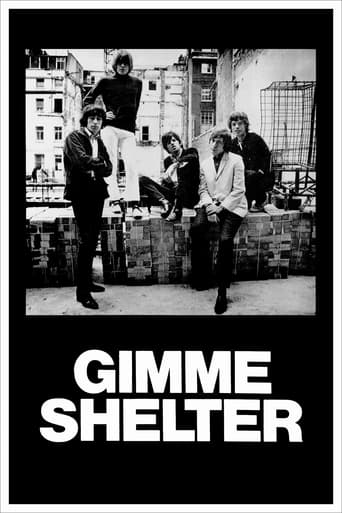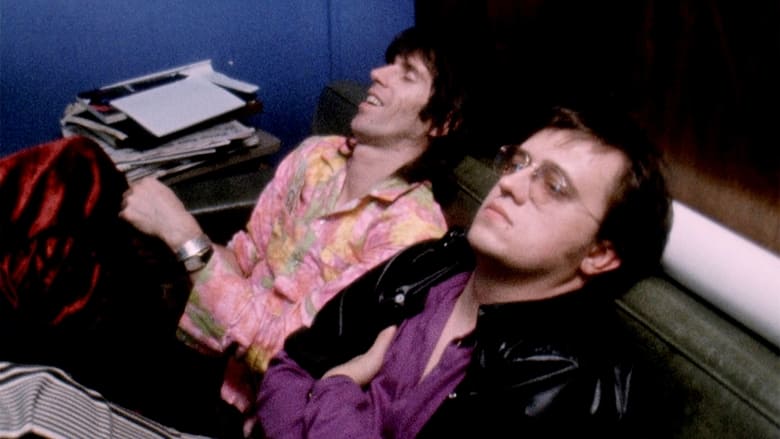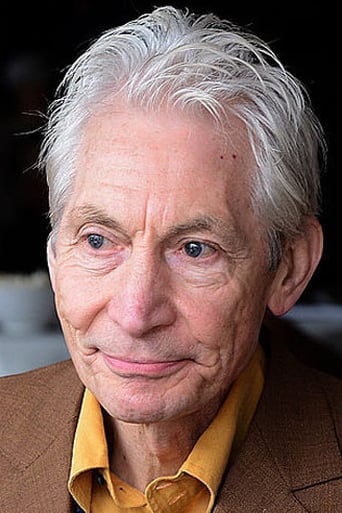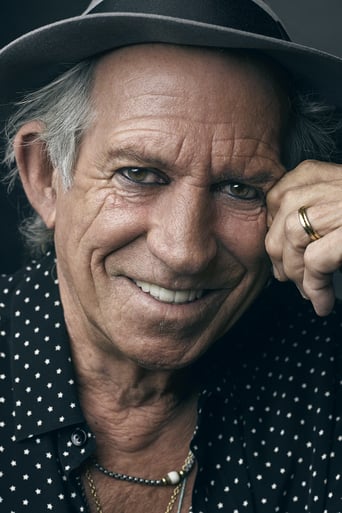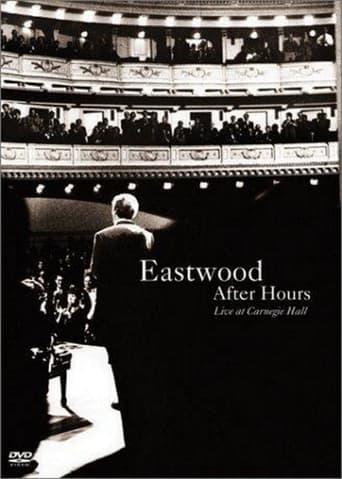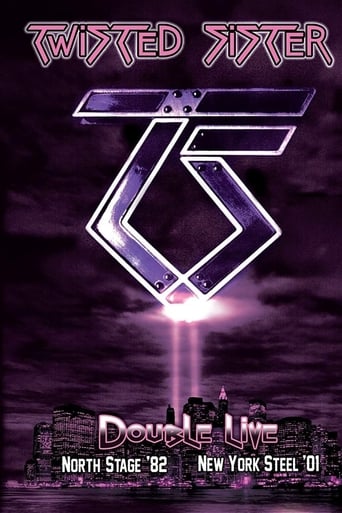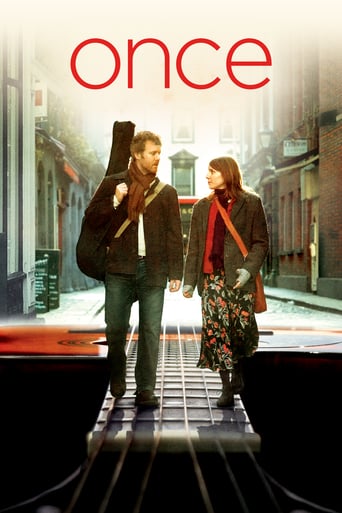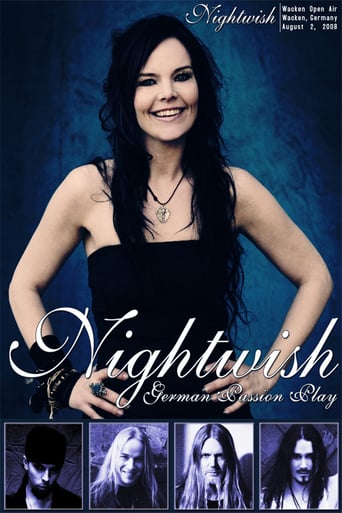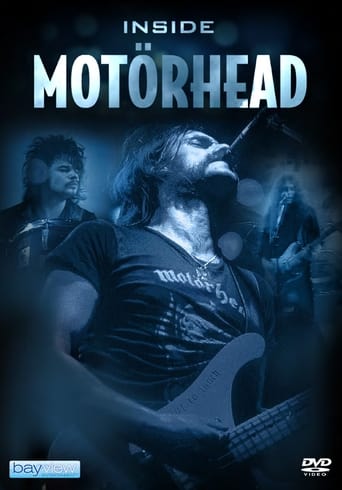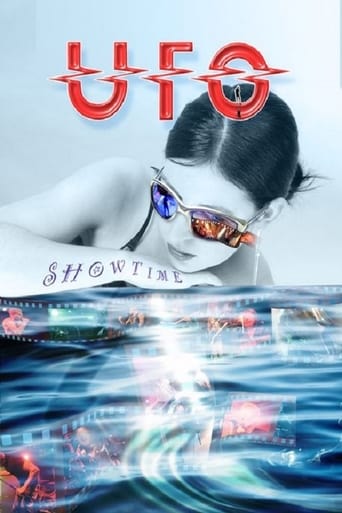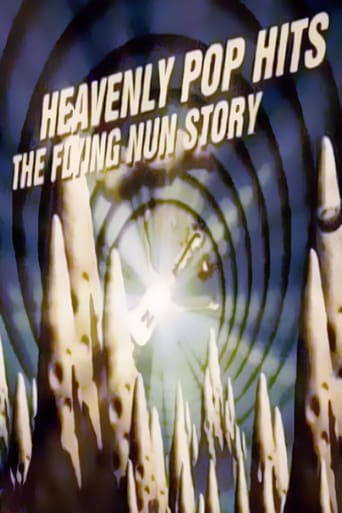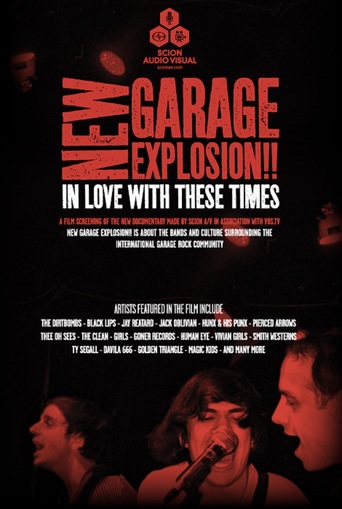Gimme Shelter (1970)
A detailed chronicle of the famous 1969 tour of the United States by the British rock band The Rolling Stones, which culminated with the disastrous and tragic concert held on December 6 at the Altamont Speedway Free Festival, an event of historical significance, as it marked the end of an era: the generation of peace and love suddenly became the generation of disillusionment.
Watch Trailer
Free Trial Channels
Cast


Similar titles
Reviews
Best movie of this year hands down!
This is a coming of age storyline that you've seen in one form or another for decades. It takes a truly unique voice to make yet another one worth watching.
Very good movie overall, highly recommended. Most of the negative reviews don't have any merit and are all pollitically based. Give this movie a chance at least, and it might give you a different perspective.
It is neither dumb nor smart enough to be fun, and spends way too much time with its boring human characters.
Great capture of rock's darkest day.A documentary on the Rolling Stones' 1969 US tour and the tragic events that concluded it. We see footage of their concerts and of them making the Sticky Fingers album in Muscle Shoals, Alabama. However, the main focus of the film is on one concert - Altamont Speedway, outside San Francisco, 6 December 1969. A free concert, it is the Stones' idea and it was meant to be the Woodstock of the West (Woodstock having occurred four months earlier). Other bands performing included Jefferson Airplane, The Flying Burrito Brothers, Ike and Tina Turner, Crosby Stills Nash and Young and Santana. However, it is far from being the peace and love of Woodstock. Part of the problem is that the Stones hired the Hells Angels as security. The other problem was that a large portion of the crowd were high on drugs. Friction ensues. During the Stones' set, Meredith Hunter, high on methamphetamine and armed with a gun, makes a lunge for the stage and is stabbed to death by the Hells Angels. The peace and love era of the 60s was over.A very well made documentary, especially considering the limited material the producers had to work with. We don't just see the concert footage but also the Stones and the film makers sitting in the studio going through the footage. We see their thoughts and reactions to what occurred. Some of this feels contrived or staged but for the most part it provides a narrative to what happened. Otherwise we would just have concert footage with no explanation of what to expect or what was going on.The fact that the Meredith Hunter incident is mentioned early on in the film helps the tension in the movie. You know something is going to happen, but you don't know when. You see the friction preceding the incident and there's now an inevitability to it all. It plays out like a thriller, ultimately.The camera work at the concert contributes too. The roughness of the shots adds an edginess and feeling of anarchy to the proceedings. The footage preceding the Altamont concert is quite interesting too. We see some Stones concert footage from other concerts, and get complete songs from these concerts. These are probably the only enjoyable live music moments from the movie, as the Altamont songs are too soaked in tension and the threat of violence to fully enjoy. The Sticky Fingers footage is great too, seeing a classic album being formed. In the movie it only lasts a few minutes but it deserves a documentary of its own. The highlight was seeing Jagger and Richards listening to an early take of Brown Sugar. Quite illuminating to see artists' views of their own work.Overall, one of music's most infamous incidents, quite accurately captured.
(contains spoilers) Filmed over the course of ten days, Gimme Shelter is the film that catapulted The Maysles' Brothers and Charlotte Zwerin to the forefront of "direct cinema" – a term the Maysles' coined and preferred over the highly assumptive "cinema vérité". As originally planned, Gimme Shelter was to be a celebratory document of The Rolling Stones' 1969 tour of the U.S. that began with the Thanksgiving show at Madison Square Garden which opens the film, and ended with the free concert given at the Altamont Speedway near San Francisco. What the Maysles', Zwerin and their crew ended up with though, was the celluloid equivalent of an autopsy – the body dissected is the 1960s itself. In fact the only other movie that tenses me up more than Gimme Shelter is Stan Brakhage's faceless autopsy-room documentary The Act of Seeing With One's Own Eyes, a title that could be transposed with the Maysles' film. Cynical? Perhaps. But before Gimme Shelter, never before in a film had the actions of the micro reflected the failures of the macro in such a telling and startling way. Both Brakhage's and the Maysles' films depict decay, disintegration, the cold, harsh reality that befalls everything, be it life or credo.But what makes a decade? This ethereal term we use to describe a grouping of ten years is always loaded with highly distinct connotations of its particular time – some are arguable, some are universally accepted. Strangely enough, despite whatever man-made structure the 'decade' has as its skeleton, key social and historical events always seem to occur soon before, during or immediately after its cusp, events that serve as both endings and beginnings. The moment that defines the passing of one decade into another is always open for debate. However, the actions that transpire in this brilliant and sobering film actually give flesh, albeit bloodied, to the unarguable exact cusp between the 1960s and the 1970s.Was Woodstock, which had been only four months before, a fluke? Half a million people coming together, without serious incident, for three days of peace, harmony, music, and love. Incredible evidence that the progressive love-work of the decade had accomplished its promises. Yet in Gimme Shelter half that number of people swirl into an abyss. And at its obscure center are The Rolling Stones themselves – charismatic to no end, yet languorous and floating in ennui. Whether they were primadonnas or not that night, once Mick Jagger hits the stage he truly becomes the foreboding dark-knight, the chanting shaman, the sinister devil's agent, all those labels with which he'd (and still has) been copiously laden.The event that made Altamont (and therefore this film) infamous – the death of Meredith Hunter at the hands of stage security Hell's Angels – is disclosed at the beginning, much like film noir actually, making the 80-minute interim before the fact be all the more nail-biting. So powerful is the actual murder scene – when you know what's going on, but no one else really does (or do they?) – that I doubt you'll ever be able to listen to "Under My Thumb" again without thinking of Gimme Shelter, and this indelible moment. Meredith Hunter's loud green suit. The Hell's Angel stabbing him twice in what looks like the back of the neck. Does Mick notice what's going on? One moment you think so. The next it's hard to tell. All the while he's singing, " I can still look at someone else." It's chilling as well that the closing, repeated refrain of that particular song is, "Take it easy, babe "In Woodstock, the 'happenings' are all jovial. When you see people tripping out or high, it comes across as good vibes. In Gimme Shelter, the Maysles' didn't shy away from the bad trips. Look at the faces of those squashed against the stage during the climax; the chilling, paisley-clad hippie during "Under My Thumb" whose just to the right of Mick – it's like watching a lysergically-infused lycanthrope going through the moon-change; the frenzied, seemingly autonomous (thereby anti-hippie) dances during the Jefferson Airplane's "The Other Side of Life"; even Mick Jagger himself gets hated on the moment he lands at the Speedway. It's as if the whole day was cursed from the start. Urban legend has it that Kenneth Anger had done just that to Mr. Jagger, for only months prior he dropped out of the lead role in Anger's Lucifer Rising (leaving Anger high and dry), and for not properly acknowledging Anger's influence on his songwriting, namely "Sympathy For the Devil".Once the murder had been recognized in the editing room, did the Maysles' choose to make Gimme Shelter one big bad vibe, or was that all they had to work with? We'll probably never know for certain. But by most accounts of those who were really at Altamont, it was no editing ploy. The decade ended that cold early December day, but at least it was able to die where it was born. "It's down to me, the change has come " Indeed.
Contrary to the apparent tone of a rambling previous review, Meredith Hunter was hardly innocent. If he was merely attempting to stand up to the Angels because of their (hardly surprising) thuggery, how is it, then, that he presumably already had a gun with him when he came to the show? Either that, or he knew where to go looking for one when he got there, which still shows premeditation and a strong possibility of already having had connections to the person or group that was the source of the gun. Oh, and by the way, most of the violence in the audience was caused by the audience members themselves, most of which were well removed from the area of the stage, where the Angels were primarily set up.No, amidst this sea of stupidity on all levels, stupidest of all was Meredith Hunter, and I can hardly believe some people still don't understand that waving a gun at the stage in a drugged- up rage will always look like someone is intending to do some serious harm to any number of people (many agree it was actually the Stones themselves who were the likely target, not any of the Angels). But then, I can believe it after all, because lots of people today aren't any smarter.
Granted,The Woodstock Music & Art Fair had it's share of downers & bummers than the starry-eyed,stoned out audience members would admit to (there were several drug overdoses,a tragic death of a sleeping audience member by being run over by a tractor in a field next door to Max Yasgur's farm,and there was Abbie Hoffman being kicked off the stage by a surly Pete Townsend of The Who,who was in a foul mood that day),but hands down,The Altamont Free Concert holds all of the cards for perhaps what had to be one of the biggest downers of the end of the 1960's,as far as concerts go. Besides the main attraction (The Rolling Stones),there was The Jefferson Airplane,The Grateful Dead,The Flying Burrito Brothers,and others. The mere fact that The Rolling Stones, hiring the Hell's Angels had to be what was obviously the biggest blunder move of all times. The film,directed & filmed by Albert & David Mayles,etc.depicts most of the ugly vibes that was present at the fated festival that was supposed to equal,if not rival Woodstock,and would eventually leave a sour taste in the (collective) mouths of concert promoters for years to come (subsequent concerts in the 1970's would also feature violence,drug overdoses,rampant capitalism,and worse yet,a plague of armchair Marxists,who were basically, over privileged college aged young people who had an attitude that "music belongs to the people,so the music should be free,man"---come on now,were they not aware of the concept of "supporting the arts"?). In the film, we also get to see some footage of some of the better gigs that the Rolling Stones played on that tour,such as the Madison Square Garden show earlier on that tour. This is a well put together documentary of an unfortunate event in Rock & Roll history. There are at least two versions of this film in existence. One,rated 'R' by the MPAA,that contains some vulgar language,nudity & that infamous murder scene during the Rolling Stones concert sequence,on camera by the Hell's Angels,and a watered down PG version,minus most of the stronger language,nudity,but still has the murder scene,intact. Take your choice. (POSTNOTE:there is a remastered,director's cut of the film re-released a few years ago that is the original 1970 version,with additional footage,that is unrated by the MPAA)

